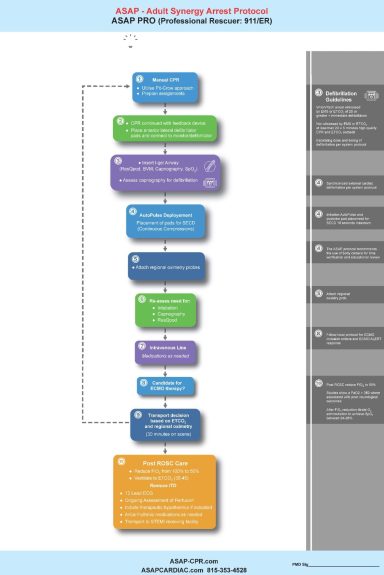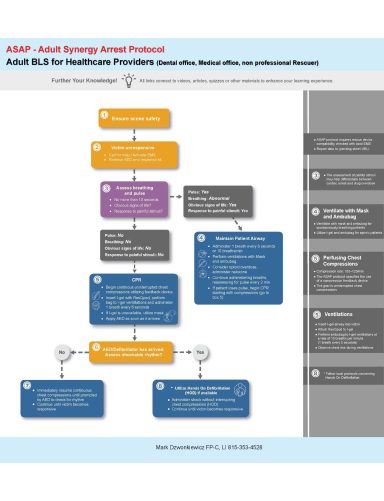ASAP
(Adult Synergy Arrest Protocol) ®
CPR/ACLS (Arrest Algorithms)
Its not just restarting the Heart, its about restoring their Life.
Real-world survival rates increased from 10% to 60-70%
with improved neurological outcomes.
True High Performance Team Training for Prehospital Providers.
The ASAP/ CPR, BLS and ASAP Pro High Performance Team training represent the only treatment algorithms containing interventions proven to signifigantly increase survival compaired to the current AHA reccomendations for AOHCA.
ASAP Protocols are American Heart Association approved for High Performance Teams.
ASAP COO is a Member of the National Association of EMS Educators.
“The entire system design
should be refocused on
producing good outcomes.”
— Member of EMS Agenda 2050
Technical Expert Panel
"The good physician treats the disease; the great physician treats the patient who has the disease."
- Sir William Osler
Which AHA Certifications Can I Replace with the ASAP Protocol? And Which Course is Right for Me?
There are courses in which the ASAP Protocols directly replaces the American Heart Association (AHA) for educational offerings for Adult Cardiac Arrest management and certification.
The ASAP Pro Protocol serves as an adjunct to Advanced Cardiovascular Life Support (ACLS) training,or as a stand alone course for ACLS certified responders.

ASAP CPR/ LAY Person
Clients include all individuals required to hold an Adult CPR certification card.
Replaces the current AHA CPR AED for Adult Only!

ASAP Pro Rescuer
A truly novel team / educational approach combined with interventions proven to increase survival.
The ASAP algorithm serves as a valuable supplementary component to Advanced Cardiac Life Support (ACLS).

ASAP BLS Card Medical non-Rescue
Clientele Includes Medical and Dental Practices
The ASAP Protocol acknowledges the distinct roles within the medical personnel community, highlighting that the majority do not function as professional rescuers. This certification replaces the current AHA Basic Life Support card (HCP).

The ASAP
High Performance Team Training System
The critical missing link in adult cardiac arrest responce training
We are excited to introduce the ASAP High Performance Team Training System, a comprehensive and straightforward training solution designed for use by any responding agency.
Our truly unique approach creates a TRUE High Performance Team with a plan of exicution focused on the needs of the AOHCA patient.
Your Medics will love this!
Transforming the Grim Reality of OHCA Survival Rates:
It is imperative to emphasize that the Cardiac Arrest Algorithm warrants distinct attention, as it is merely one among various algorithms taught in the traditional ACLS class, yet this one algorithm ,the adult cardiac arrest algorithm is where we loose all the lives! With approximately 400,000 fatalities annually, and an average patient age of 67, this must be corrected, ASAP.
The ASAP Protocol represents an advanced curriculum specifically dedicated to the management of adult cardiac arrest. The ASAP Pro protocol can be seamlessly integrated into the standard Advanced Cardiovascular Life Support (ACLS) course.
The ASAP Pro High Performance Team Training System is avalable as a stand alone course for your ACLS certified providers. On-line class with live video review. No need for travel.
AHA Acknowledges the Life-Saving Impact of Interventions Utilized in the ASAP Protocols!
The ASAP-CPR Program transforms high-performance OHCA response into a tangible reality.
The AHA nas NEVER increased survival from adult OHCA
Ever. See below.

A Hisory of
Poor Patient Outcomes
Since its establishment, the American Heart Association (AHA) has not produced any significant improvement in survival rates associated with Adult out-of-hospital cardiac arrest (OHCA).
Average age of death 67.
2015
Paramedic Joe Powell presents innovative interventions that significantly enhance survival rates from 10% to nearly 70%. This initiative, known as the Rialto Toolbox, exemplifies advancements in emergency medical response. They have since created Advanced Cardiac Resuscitation (ACR) https://acrmoonshot.com/
When the American Heart Association (AHA) opted not to incorporate Joe Powell's innovative contributions to adult cardiac resuscitation in the 2020 Advanced Cardiac Life Support (ACLS) updates, the organization ASAP was subsequently established.
2024
The Adult Synergy Arrest Protocol (ASAP) has been formally established and its mission approved by the American Heart Association for high-performance teams.
This initiative encompasses three novel arrest algorithms designed to create a top to bottom emergency response. Creating a TRUE community responce.
For the Pre-Hospital Professional Resucer our unique High Performance Team Training System is a game changer!
Average age of death? About 2 years into retirement.
An important message from Dr. Mickey Eisenberg from the Resuscitaion Academy. Please visit them form our link page!
ASAP Cardiac supports the 10 reccomendations of the Resuscitation Academy.